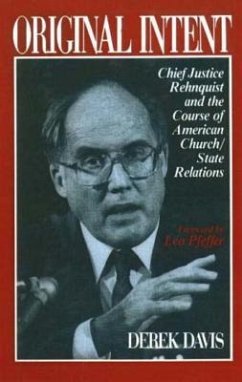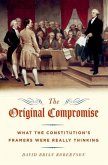Contemporary debate in the area of church/state relations centers around the religion clauses of the First Amendment: "Congress shall make no law respecting the establishment of religion [the Establishment Clause] or prohibiting the free exercise thereof [the Free Exercise Clause]." Original Intent is a readable and objective summary of the views of Chief Justice Rehnquist and an enlightening treatise on the future of church/state relations in America. Derek Davis begins with a brief biographical profile of Rehnquist and an overview of his broad judicial philosophy. The book also includes a summary of the importance of original intent in constitutional jurisprudence; an examination of the events, people, and documents which at the time of the nation's founding were instrumental in adoption of the First Amendment religion clauses; an account of the Supreme Court's efforts in the last two centuries to interpret and apply those clauses; an evaluation of Rehnquist's interpretations of the clauses, with emphasis on his understanding of the framer's original intent; a description of the present tensions the Supreme Court is experiencing in its efforts to formulate a workable framework for applying the religion clauses in church/state controversies; and an evaluation of Rehnquist's church/state philosophy. Davis warns that Rehnquist is leading the Supreme Court away from its separationist readings of the religion clauses and substituting accomodationist readings which, he contends, are neither in keeping with the original intentions of the Founding Fathers nor good for future American church/state relations. The current composition of the court and Rehnquist's pivotal role, Davis maintains, portend serious departures from the Court's traditional separationist stance and the possibility of sweeping changes in its approaches to the religion clauses.



![A New and Original Reply to Paine's Age of Reason [microform] A New and Original Reply to Paine's Age of Reason [microform]](https://bilder.buecher.de/produkte/66/66154/66154803m.jpg)




